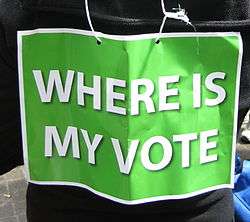Rhetorical question
A rhetorical question is one for which the questioner does not expect a direct answer: in many cases it may be intended to start a discourse, or as a means of putting across the speaker's or author's opinion on a topic.[1]

A common example is the question "Can't you do anything right?" This question, when posed, is intended not to ask about the listener's ability but rather to insinuate the listener's lack of ability.
Different forms
Negative assertions
A rhetorical question may be intended as a challenge. The question is often difficult or impossible to answer. In the example, What have the Romans ever done for us? (Monty Python's Life of Brian) the question functions as a negative assertion. It is intended to mean The Romans have never done anything for us!. When Shakespeare's Mark Antony exclaims: Here was a Caesar! when comes such another? it functions as an assertion that Caesar possesses such rare qualities they may never be seen again. (Julius Caesar, Act 3, scene 2, 257)
Negative assertions may function as positives in sarcastic contexts. For example, in Smoking can lead to lung cancer. Who knew?! the question functions as an assertion that the truth of the statement should have been utterly obvious.
Rhetorical questions as metaphors
Rhetorical questions are often used as a metaphor for a question already asked. Examples may be found in the song Maria from the 1959 Rodgers and Hammerstein musical, The Sound of Music, in which the How do you solve a problem like Maria? is repeatedly answered with another question: How do you catch a cloud and pin it down?, How do you keep a wave upon the sand? and How do you hold a moonbeam in your hand? These responses may be taken as asserting that "the problem of Maria" cannot be solved; and furthermore the choice of cloud, wave and moonbeam as metaphors for Maria give insight into her character and the nature of the problem.
In the vernacular, this form of rhetorical question is most often seen as rhetorical affirmation, where the certainty or obviousness of the answer to a question is expressed by asking another, often humorous, question for which the answer is equally obvious; popular examples include Does a bear poo in the woods?, Is the sky blue? and Is the Pope Catholic?[2][3][4]
Other forms
Sometimes the implied answer to a rhetorical question is "Yes, but I wish it were not so" or vice versa:
O mighty Caesar! dost thou lie so low?
Are all thy conquests, glories, triumphs, spoils,
Shrunk to this little measure?— Shakespeare, Julius Caesar, III.i.148
Another common form is the expression of doubt by questioning a statement just made; for example by appending the following to a sentence: "or did he?", "or is it?", as in, "The butler did it ... or did he?"
It is also common to use a rhetorical question to bring an end to a debate or to finalize a decision. For example, when internally deciding whether to perform an action, one may shove aside the dialogue with a simple, "Eh, why not?"
Rhetorical questions may be signaled by marker phrases; questions that include "after all", or "by any chance" may be intended as rhetorical.[5]
Punctuation
Depending on the context, a rhetorical question may be punctuated by a question mark (?), full stop (.), or exclamation mark (!),[6] but some sources argue that it is required to use a question mark for any question, rhetorical or not.[7]
In the 1580s, English printer Henry Denham invented a "rhetorical question mark" (⸮) for use at the end of a rhetorical question; however, it fell out of use in the 17th century. It was the reverse of an ordinary question mark, so that instead of the main opening pointing back into the sentence, it opened away from it.[8]
Quotes
"The effectiveness of rhetorical questions in argument comes from their dramatic quality. They suggest dialogue, especially when the speaker both asks and answers them himself, as if he were playing two parts on the stage. They are not always impassioned; they may be mildly ironical or merely argumentative: but they are always to some extent dramatic, and, if used to excess, they tend to give one’s style a theatrical air."[9]
"Rhetorical questioning is…a fairly conscious technique adopted by a speaker for deliberate ends, and it is used infrequently, proportional to the length of the dialogue, oration, or conversation."[10]
See also
Notes
- Gideon O. Burton, Brigham Young University. "Rhetorical questions!". specialized language definitions. Archived from the original on 2007-10-26. Retrieved 2007-10-19.
- Powell, Chris; Paton, George E. C. (1988). Humour in society: resistance and control. Macmillan. p. 67. ISBN 0-333-44070-6.
- Moon, Rosamund (1998). Fixed expressions and idioms in English: a corpus-based approach (Oxford studies in lexicography and lexicology). Oxford University Press. p. 158. ISBN 0-19-823614-X.
- Fergusson, Rosalind; Partridge, Eric (1994). Shorter dictionary of catch phrases. Routledge. p. 25. ISBN 0-415-10051-8.
- "Javier Gutiérrez Rexach, "Rhetorical Questions, Relevance and Scales", Ohio State University, 1998" (PDF). ua.es.
- http://www.whitesmoke.com/punctuation-question-mark.html#rhe Whitesmoke
- "The Question Mark". grammar.ccc.commnet.edu. Retrieved 18 March 2018.
- Truss, Lynne. Eats, Shoots & Leaves, 2003. p. 142. ISBN 1-59240-087-6.
- Gardiner, J (1907). Manual of Composition and Rhetoric. Ginn & Company. OCLC 1926080.
- Boyd, Boyd (1997). Electronic Discourse: Linguistics Individuals in Virtual Space. Albany: State University of New York Press. OCLC 42636887.
External links
- What is a rhetorical question?
- Audio illustrations of the rhetorical question
- A short definition of the term
- Paul Brians, Washington State University. "Common Errors in English". Grammatical Errors in the English Language. Retrieved 2007-10-19.
- Roger Kreuz, Aaron Ashley, and Kathryn Bartlett, University of Memphis. "Twisting Arms: Figurative Language Effects in Persuasive Discourse" (PDF). psychology research paper. Retrieved 2008-03-27.CS1 maint: multiple names: authors list (link)